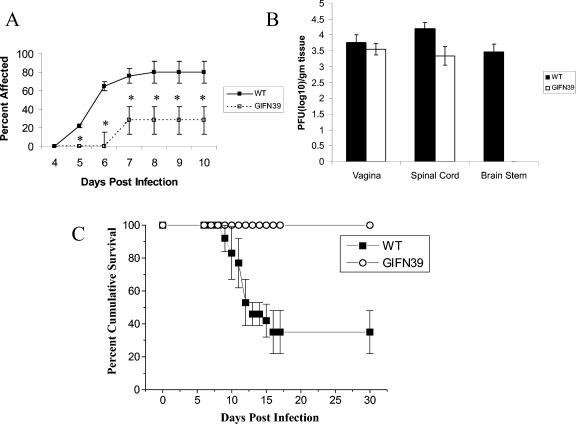FIG. 3.
Mice expressing the IFN-α1 transgene under the glial fibrillary acidic protein promoter are highly resistant to genital HSV-2 infection. Depo-Provera-treated female IFN-α1 transgenic mice (GIFN39) or nontransgenic B6/129 control mice (WT) (n = 13 to 18/group) were intravaginally infected with 2,400 PFU of HSV-2/mouse. (A) From day 4 to 10 p.i., the mice were monitored for perivaginal lesions and scored as positive or negative. *, P < 0.05 comparing the transfected to nontransfected mice or the GIFN39 to nontransgenic controls at the indicated time p.i. Results are expressed as means ± SEM. (B) Depo-Provera-treated female IFN-α1 transgenic mice (GIFN39) or nontransgenic B6/129 control mice (WT) (n = 3/group) were infected as described for panel A. At day 7 postinfection, the mice were euthanized and the vaginal tissue, spinal cord, and brain stem from the animals were isolated, homogenized, and assessed for infectious virus content by plaque assay using Vero cells. The results are representative of two experiments. (C) Depo-Provera-treated female IFN-α1 transgenic mice (GIFN39) or nontransgenic B6/129 control mice (WT) (n = 13 to 18/group) were infected as described for panel A and monitored for survival until day 30 p.i. Results are expressed as means ± SEM. The results are a summary of three experiments; n = 4 to 7 mice/group/experiment. *, P < 0.05, comparing the GIFN39 to nontransgenic controls.

